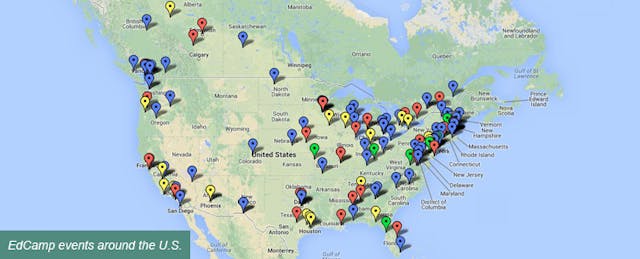Hear the word “unconference,” and you may frown your face in confusion at the meaning of the word.
Conferences themselves are quite familiar for most K-12 teachers. Conferences are essentially professional development where you go sit in a room somewhere, follow a moderator’s directions, and get lectured at for a bit - whether or not it relates to your subject or grade level. But what part does the participant play? Most often that of a tacit observer.
That’s why Dan Callahan, co-founder of EdCamp, is hoping to introduce the word “unconference” into more educators’ vocabularies. “We don't feel all professional development is terrible,” Callahan admits. “But our goal is to advocate for more professional development that's led by the educators, that's focused on what their specific needs are.” That goal--to let educators take charge of their own PD--has been Callahan’s mission for the past three and a half years, ever since he led the first official EdCamp “unconference” in May 2010.
EdCamp is a one-day session uniting teachers, tech experts, entrepreneurs, and anyone else who is interested in the K-12 landscape. To start, a moderator introduces the central design element of EdCamp--essentially, that the participants are in charge. The participants then have the opportunity to fill up a publicly-displayed schedule with a theme or idea for a session (there are usually about 3 to 6 sessions during a given EdCamp) that they wish to lead or hope to learn more about. From that point on, participants choose to attend sessions at their leisure--meaning they have total control over what they learn and when they learn it. No assignments, no structure--a sense of organized chaos and “radical openness,” as Callahan calls it.
The theory behind EdCamp hits very close to home for Callahan. A former special education teacher, he started off like many other K-12 educators: feeling solitary in his field, desiring more connection and learning.
“I was lonely in my school,” Callahan admits, “and Twitter was an opportunity to connect with other teachers.” Callahan quickly learned how beneficial Twitter could be to his practice and sense of community, and was determined to bring it to other educators.
While attending Bar Camp Philly in November of 2009, Callahan experienced the unconference mentality for the first time, and he held a “Social Media Survival Guide for Schools” session with teacher buddies Kevin Jarrett, Kristen Swanson, Mary Beth Hertz, Ann Leaness, and Robert Rowe. Callahan explains how he saw not just teachers, but techies, parents, and social media experts come together to pool resources and discuss social media in K-12--a model that he describes as “highly social and interactive, whether it’s a discussion or hands-on examination of a tool.” Fast-forward six months, to when Callahan and Jarrett decided to team up with four other educators (Mike Ritzius, Chrissi Miles, Kim Sivick, and Hadley Ferguson) to hold their own educational version of Bar Camp (codenamed EdCamp Philly), and the EdCamp movement was born.
Since 2010, EdCamp has predominantly grown via word of mouth and social media. Callahan does not host all sessions; sustainability-wise, that would never work. So, individual educators set EdCamps up themselves. After Callahan created a Wikispace for EdCamp moderators to post their event, EdCamp began averaging one event a month in 2010. Now, numerous EdCamps are held every weekend in states and countries across the globe (Sweden, Indonesia, and the Arab Emirates, to name a few). In fact, the 300th EdCamp took place in Cape Cod during August of 2013.
The spread of EdCamp can be described as inherently “viral,” which can be attributed to a number of characteristics. First, as Callahan puts it, “You don’t need any stuff to run EdCamp. It’s nice to have food, etc., but you don’t need it.” And even then, sponsors and participants will often provide food and prizes for each EdCamp event anyway.
Additionally, EdCamp has moved beyond the periphery to break into traditional institutions like the Massachusetts Teachers Association, which has asked Callahan to host a one-day unconference for the past two years.
But perhaps most dynamically, EdCamp provides educators with the ability to learn and establish connections with other passionate education-enthusiasts, whether it’s at the event or via Twitter. Even students stop by the events, which Callahan excitedly supports. Recently, Callahan brought five students to EdCamp Boston to speak about 1:1 implementation. “People always love to hear what the kids say,” Callahan says.
Similar to Twitter chats, EdCamp forms communities that people can become a part of, and participate in at their leisure. PD is not forced within the EdCamp Twitter forums, but rather becomes an option that educators can utilize when they need to.
While EdCamp strongly appeals to those interested in educational technology, likely resulting from its origins in social media instruction, there is an openness to whatever participants want to discuss. Maybe you’re interested in the Common Core, Callahan says, “but you’re only talking to people in your district, whereas at EdCamp, you’re talking to people from all over the region.”
So far, Callahan estimates that over 10,000 individuals have participated in EdCamp events since its founding. So what does EdCamp offer that traditional professional development cannot?
The EdCamp model eliminates the bureaucracy and administrative overhead of the typical PD experience, where the participant has little control over skills taught or information presented. True to its origin, EdCamp is an organic form of freely-designed PD that is led by the participants themselves. And it should come as no surprise that teachers appreciate the ability to engage in participant-directed PD--just look at the way support for K-12 self-directed learning has flooded the education reform blogosphere.
Sounds like the “unconference” concept should become the norm--not the exception.


